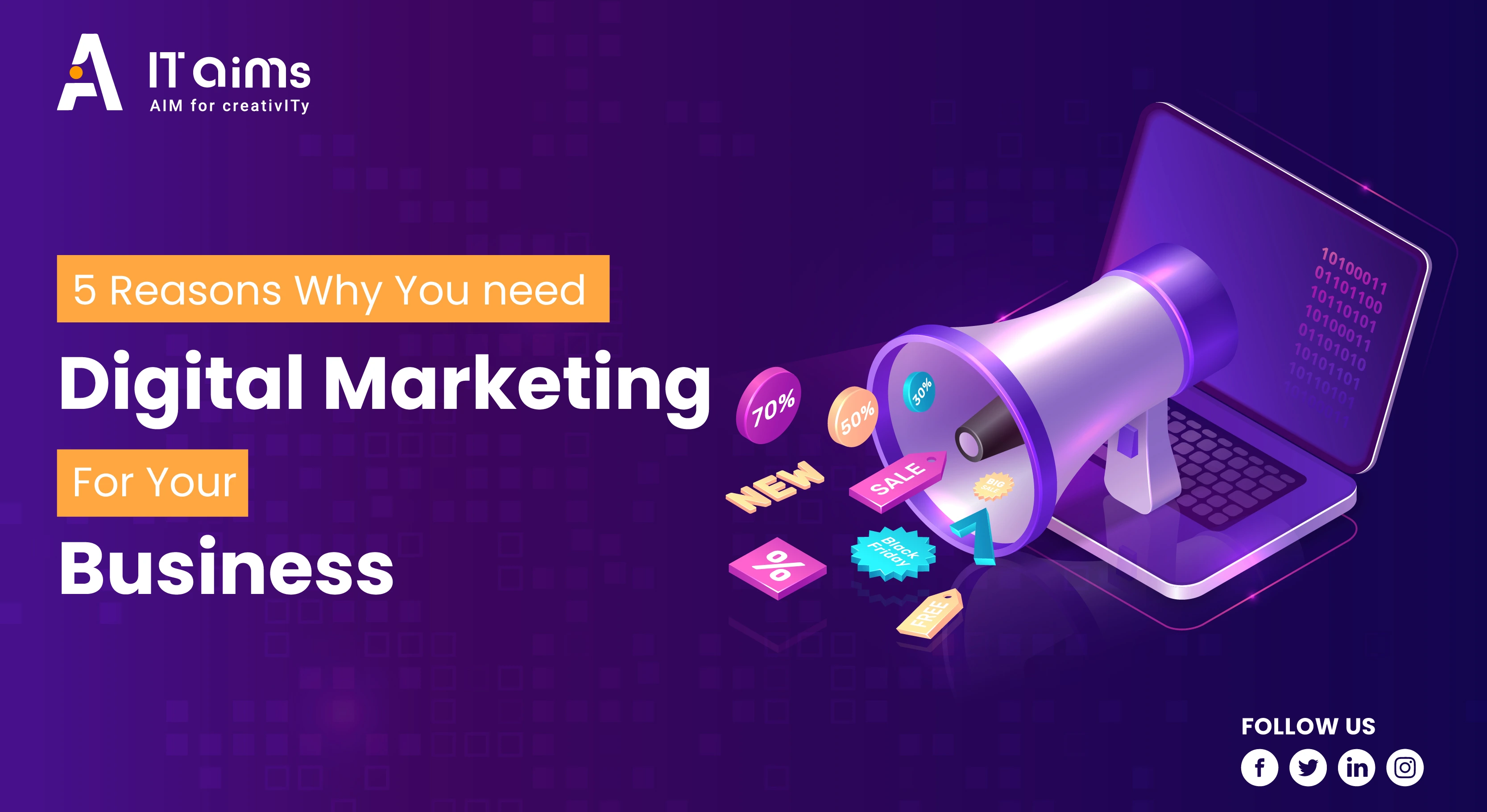
5 Reasons Why Your Business Needs Digital Marketing Strategy
Artificial Intelligence (AI) has emerged as one of the most impactful technologies in recent years. It involves creating intelligent machines capable of performing tasks that typically require human intelligence, such as speech recognition, natural language understanding, and data-driven decision-making. AI has the potential to transform various aspects of our lives, including healthcare, education, business, and entertainment. In this blog post, we will discuss the importance of AI and how it can benefit you.
With the rapid rise of the digital age, traditional marketing methods such as print ads and billboards are no longer sufficient to capture the attention of your target audience. Meanwhile, digital marketing has become a key tool for IT companies to reach and connect with potential customers.
Here are the top reasons why your IT business needs a digital marketing strategy:
1. Improved visibility
With so many IT companies in the spotlight, it's important to stand out from the crowd. Digital marketing can help you increase your visibility and reach more people through search engine optimization (SEO), social media marketing, email marketing, and other online tactics.
2. Targeted Marketing
One of the main advantages of digital marketing is the ability to target specific demographics and interests. With tools like Google Ads and social media advertising, you can create targeted campaigns that reach the right people at the right time.
3. Cost efficient
Compared to traditional marketing methods, digital marketing is much more cost-effective. Create effective campaigns that drive traffic and generate leads, even on a tight budget.
4. Measurable results
Digital marketing allows you to track and measure campaign results in real-time. This allows you to adjust your strategy and optimize your campaigns for maximum effect.
5. Improving customer relationships
Digital marketing offers many ways to connect with your customers and build strong relationships. Social media platforms like Facebook and Twitter allow you to interact directly with your customers. Email marketing campaigns can also provide valuable information and resources to your subscribers.
Conclusion
Understanding your target audience and the channels through which they consume information is critical to developing an effective digital marketing strategy. From there, you can develop a comprehensive plan that includes SEO, social media, email marketing, and other tactics that align with your business goals.
In summary, a digital marketing strategy is essential for any IT business that wants to grow and compete in today's digital environment. Leverage the power of digital marketing to increase awareness, generate leads, and build strong relationships with your customers.
FAQs
- Q.1: What business needs digital marketing?
In today's digital age, almost every business needs digital marketing to effectively promote their products or services, build brand awareness, and connect with potential customers online. Here are some examples of businesses that can benefit from digital marketing: E-commerce businesses: Online stores that sell products or services benefit greatly from digital marketing to reach a wider audience, increase online sales, and generate more revenue. Service-based businesses: Businesses that offer services such as web design, consulting, legal or accounting services, and healthcare providers can use digital marketing to showcase their expertise and attract new clients. Startups: Digital marketing is essential for startups to get the word out about their new business and to create a strong online presence from the start. Local businesses: Even small businesses can benefit from digital marketing to reach their local audience and attract new customers through local search engine optimization (SEO) and targeted advertising. B2B companies: Digital marketing can help B2B companies generate leads and build relationships with potential clients through email marketing, social media, and content marketing. Overall, almost every business can benefit from digital marketing in some way. It allows businesses to reach a wider audience, build brand recognition, and drive more leads and sales.
- Q.2: What are the main objectives of digital marketing?
The main objectives of digital marketing are to: Increase brand awareness: Digital marketing helps businesses to create a strong online presence, increase their visibility, and build brand recognition among their target audience. Generate leads: Digital marketing techniques such as email marketing, content marketing, social media marketing, and search engine optimization (SEO) can help businesses generate more leads and potential customers. Drive sales: Digital marketing can help businesses to increase their online sales through targeted advertising, retargeting, and other conversion optimization strategies. Build customer relationships: Digital marketing enables businesses to engage with their customers, build relationships, and create a loyal customer base through social media, email marketing, and other communication channels. Improve customer experience: Digital marketing can help businesses to provide a better customer experience by providing personalized content, responsive website design, and easy-to-use online platforms. Measure and analyze performance: Digital marketing provides businesses with the ability to measure and analyze their marketing efforts, allowing them to optimize their strategies and improve their overall performance. Overall, the main objectives of digital marketing are to increase brand awareness, generate leads, drive sales, build customer relationships, improve customer experience, and measure and analyze performance.
- Q.3: What are 4 keys of digital marketing?
There are many important aspects of digital marketing, but here are four key elements that are essential for a successful digital marketing strategy: Content marketing: Creating and distributing valuable, relevant, and engaging content is the foundation of any successful digital marketing strategy. Content marketing can take many forms, such as blog posts, videos, infographics, social media posts, and more. The goal is to provide your target audience with the information they need and to position your brand as a thought leader in your industry. Search engine optimization (SEO): SEO is the process of optimizing your website and content to rank higher in search engine results pages (SERPs) for relevant keywords. By improving your website's SEO, you can drive more traffic to your site and increase your visibility to your target audience. Social media marketing: Social media platforms such as Facebook, Instagram, Twitter, and LinkedIn are important channels for digital marketing. Social media marketing allows businesses to connect with their target audience, build brand awareness, and drive engagement and conversions through organic and paid social media campaigns. Data analytics: Measuring and analyzing the performance of your digital marketing efforts is essential for optimizing your strategy and achieving your marketing goals. By using tools such as Google Analytics, businesses can track website traffic, user behavior, conversion rates, and other key metrics to gain insights and make data-driven decisions. These four keys of digital marketing - content marketing, SEO, social media marketing, and data analytics - work together to create a comprehensive and effective digital marketing strategy.
- Q.4: What are the 7 main categories of digital marketing?
Digital marketing encompasses a wide range of tactics and techniques. Here are the 7 main categories of digital marketing: Search Engine Optimization (SEO): SEO is the process of optimizing your website to rank higher in search engine results pages (SERPs) for relevant keywords. It includes both on-page and off-page optimization techniques. Pay-per-click advertising (PPC): PPC advertising allows businesses to place ads on search engines, social media platforms, and other websites and pay for each click on their ad. This can be an effective way to drive targeted traffic to your website and increase conversions. Social media marketing (SMM): SMM involves using social media platforms like Facebook, Instagram, Twitter, and LinkedIn to build brand awareness, engage with customers, and drive website traffic. Content marketing: Content marketing involves creating and distributing valuable, relevant, and consistent content to attract and retain a clearly defined audience and ultimately drive profitable customer action. Email marketing: Email marketing involves sending targeted messages to a list of subscribers to promote your products or services, build relationships with customers, and drive conversions. Mobile marketing: Mobile marketing involves targeting customers on their mobile devices through tactics like mobile apps, SMS and MMS messaging, and mobile-friendly websites. Video marketing: Video marketing involves using videos to promote your brand, products, or services. This can include videos on social media, YouTube, and other platforms. By utilizing these 7 main categories of digital marketing, businesses can create a comprehensive and effective digital marketing strategy to reach and engage with their target audience, increase conversions, and grow their business.
- Q.5:What are the 5 A's of digital marketing?
The 5 A's of digital marketing are a framework for creating a successful digital marketing strategy. They are: Attract: The first step is to attract potential customers to your website or digital platforms through various marketing channels such as search engine optimization (SEO), pay-per-click (PPC) advertising, social media marketing, and content marketing. Audiences: Once you have attracted potential customers, the next step is to understand and define your target audience. You need to know who your ideal customers are, their interests, behaviors, and preferences to tailor your marketing messages and strategies to their needs. Attention: To capture your audience's attention, you need to create engaging and relevant content that resonates with them. This includes optimizing your website and landing pages, creating compelling headlines, and using multimedia content such as videos and images. Action: The ultimate goal of digital marketing is to drive customer actions such as purchasing a product, subscribing to a service, or filling out a form. To achieve this, you need to create clear and compelling calls-to-action (CTAs) that encourage customers to take the desired action. Analysis: The final step is to measure and analyze the results of your digital marketing efforts. This involves tracking key performance indicators (KPIs) such as website traffic, conversions, and engagement rates, and using this data to optimize your strategies and improve your overall digital marketing performance. By following the 5 A's of digital marketing framework, businesses can create a comprehensive and effective digital marketing strategy that attracts, engages, and converts potential customers while continuously analyzing and optimizing their performance.
Popular Searches
Tags:


